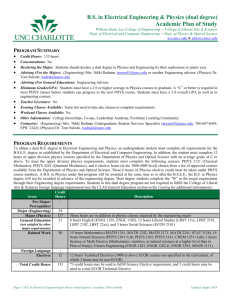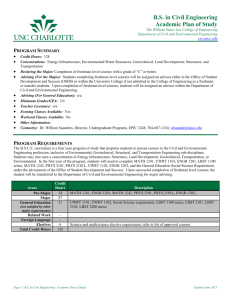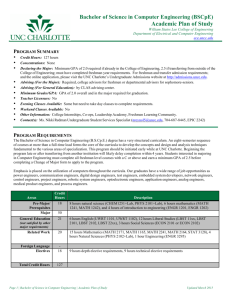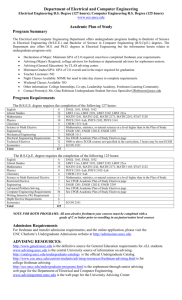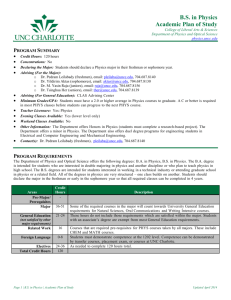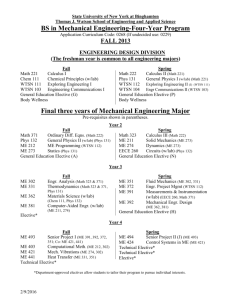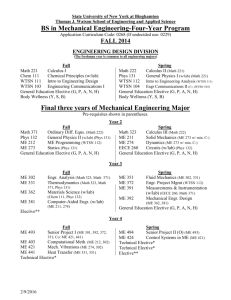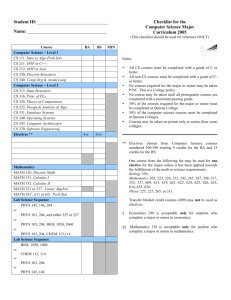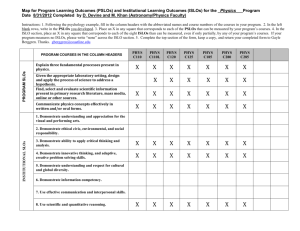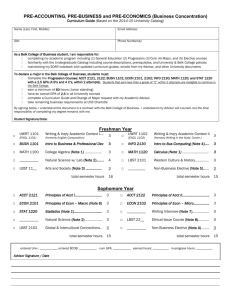BS in Computer Engineering & Physics
advertisement
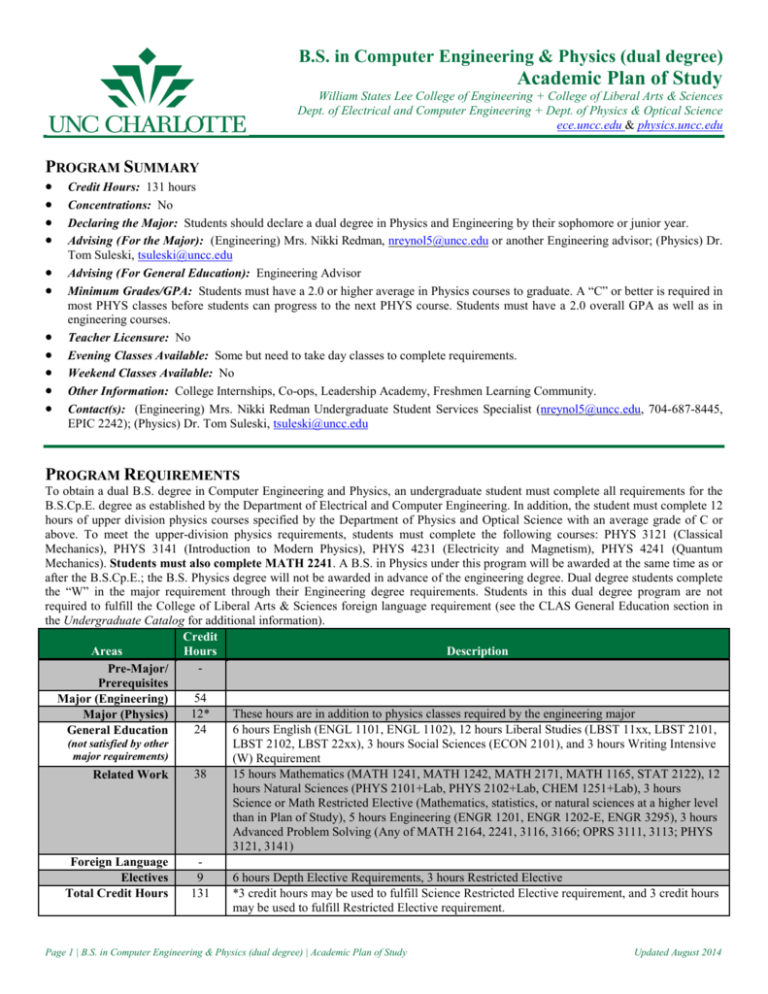
B.S. in Computer Engineering & Physics (dual degree) Academic Plan of Study William States Lee College of Engineering + College of Liberal Arts & Sciences Dept. of Electrical and Computer Engineering + Dept. of Physics & Optical Science ece.uncc.edu & physics.uncc.edu PROGRAM SUMMARY • • • • • • • • • • • Credit Hours: 131 hours Concentrations: No Declaring the Major: Students should declare a dual degree in Physics and Engineering by their sophomore or junior year. Advising (For the Major): (Engineering) Mrs. Nikki Redman, nreynol5@uncc.edu or another Engineering advisor; (Physics) Dr. Tom Suleski, tsuleski@uncc.edu Advising (For General Education): Engineering Advisor Minimum Grades/GPA: Students must have a 2.0 or higher average in Physics courses to graduate. A “C” or better is required in most PHYS classes before students can progress to the next PHYS course. Students must have a 2.0 overall GPA as well as in engineering courses. Teacher Licensure: No Evening Classes Available: Some but need to take day classes to complete requirements. Weekend Classes Available: No Other Information: College Internships, Co-ops, Leadership Academy, Freshmen Learning Community. Contact(s): (Engineering) Mrs. Nikki Redman Undergraduate Student Services Specialist (nreynol5@uncc.edu, 704-687-8445, EPIC 2242); (Physics) Dr. Tom Suleski, tsuleski@uncc.edu PROGRAM REQUIREMENTS To obtain a dual B.S. degree in Computer Engineering and Physics, an undergraduate student must complete all requirements for the B.S.Cp.E. degree as established by the Department of Electrical and Computer Engineering. In addition, the student must complete 12 hours of upper division physics courses specified by the Department of Physics and Optical Science with an average grade of C or above. To meet the upper-division physics requirements, students must complete the following courses: PHYS 3121 (Classical Mechanics), PHYS 3141 (Introduction to Modern Physics), PHYS 4231 (Electricity and Magnetism), PHYS 4241 (Quantum Mechanics). Students must also complete MATH 2241. A B.S. in Physics under this program will be awarded at the same time as or after the B.S.Cp.E.; the B.S. Physics degree will not be awarded in advance of the engineering degree. Dual degree students complete the “W” in the major requirement through their Engineering degree requirements. Students in this dual degree program are not required to fulfill the College of Liberal Arts & Sciences foreign language requirement (see the CLAS General Education section in the Undergraduate Catalog for additional information). Credit Areas Hours Description Pre-Major/ Prerequisites 54 Major (Engineering) 12* These hours are in addition to physics classes required by the engineering major Major (Physics) 24 6 hours English (ENGL 1101, ENGL 1102), 12 hours Liberal Studies (LBST 11xx, LBST 2101, General Education (not satisfied by other LBST 2102, LBST 22xx), 3 hours Social Sciences (ECON 2101), and 3 hours Writing Intensive major requirements) (W) Requirement 38 15 hours Mathematics (MATH 1241, MATH 1242, MATH 2171, MATH 1165, STAT 2122), 12 Related Work hours Natural Sciences (PHYS 2101+Lab, PHYS 2102+Lab, CHEM 1251+Lab), 3 hours Science or Math Restricted Elective (Mathematics, statistics, or natural sciences at a higher level than in Plan of Study), 5 hours Engineering (ENGR 1201, ENGR 1202-E, ENGR 3295), 3 hours Advanced Problem Solving (Any of MATH 2164, 2241, 3116, 3166; OPRS 3111, 3113; PHYS 3121, 3141) Foreign Language 9 6 hours Depth Elective Requirements, 3 hours Restricted Elective Electives 131 *3 credit hours may be used to fulfill Science Restricted Elective requirement, and 3 credit hours Total Credit Hours may be used to fulfill Restricted Elective requirement. Page 1 | B.S. in Computer Engineering & Physics (dual degree) | Academic Plan of Study Updated August 2014 SUGGESTED PLAN OF STUDY Freshman Year Course Number Fall Semester ENGL 1101 ENGR 1201 CHEM 1251 CHEM 1251L ECGR 2103* MATH 1241 Spring Semester ENGL 1102 ENGR 1202 PHYS 2101 PHYS 2101L ECGR 2104* MATH 1242 Credit Hours General Education Writing and Inquiry in Academic Contexts I Introduction to Engineering Practices and Principles I Principles of Chemistry Principles of Chemistry Lab Computer Utilization in C++ Calculus I 3 2 3 1 3 3 X Writing and Inquiry in Academic Contexts II Introduction to Engineering Practices and Principles II Physics for Science and Engineering I Physics for Science and Engineering I Lab Computer Engineering Programming II Calculus II 3 2 3 1 3 3 X Course Title W/O Course Notes X X *new course listing beginning Fall 2012 X X *new course listing beginning Fall 2012 X 30 Credit Hours for Year Sophomore Year Course Number Fall Semester ECGR 2111 ECGR 2155 ECGR 2181 MATH 2171 PHYS 2102 PHYS 2102L LBST 110X Spring Semester ECGR 2112 ECGR 2156 ECGR 3181 MATH 1165 STAT 2122 ECON 2101 Course Title Credit Hours Network Theory I Instrumentation and Networks Laboratory Logic Systems Design I Differential Equations Physics for Science and Engineering II Physics for Science and Engineering II Lab LBST 1100 Series: Arts and Society 3 1 3 3 3 1 3 Network Theory II Logic and Networks Laboratory Logic System Design II Introduction to Discrete Structures Probability and Statistics Principles of Economics Macro 3 1 3 3 3 3 General Education W/O Course Notes W X W X Fulfills Social Science General Edu Requirement 33 Credit Hours for Year Junior Year Course Number Fall Semester ECGR 3111 ECGR 3131 ECGR 3155 ENGR 3295 ECGR 3183 LBST 2101 LBST 221X Spring Semester ECGR 2255 ECGR 3123 ECGR 3132 PHYS 3141 MATH 2241 LBST 2102 Course Title Credit Hours Signals and Systems Fundamentals of Electronics and Semiconductors Systems and Electronics Lab Professional Development Computer Organization Western Cultural and Historical Awareness LBST 2200 Series: Ethical Issues and Cultural Critique 3 3 1 1 3 3 3 Digital Design Laboratory Data Communications and Networking Electronics Intro to Modern Physics (Math or Science Restricted Elective) Calculus III (Advanced Problem Solving) Global and Intercultural Connections 2 3 3 3 3 3 General Education W/O Course Notes W X X (Available Summer also) X 34 Credit Hours for Year Senior Year Course Number Fall Semester ECGR 3253 XXXX XXXX ECGR 4101 ECGR 4146 PHYS 3121 Spring Semester ECGR 3254 ECGR 3159 ECGR 4124 XXXX XXXX PHYS 4231 Course Title Credit Hours Senior Design I 2XXX Level Writing Intensive Embedded Systems Introduction to VHDL Classical Mechanics I 2 3 3 3 3 Senior Design II Professional Practice Digital Signal Processing Depth Elective #1 Electromagnetic Theory I (Restricted Elective) 3 2 3 3 3 General Education W/O Course X W,O W X W,O Notes 28 Credit Hours for Year Page 2 | B.S. in Computer Engineering & Physics (dual degree) | Academic Plan of Study Updated August 2014 Additional Semester Course Number Fall Semester PHYS 4241 XXXX XXXX Course Title Quantum Mechanics I Depth Elective #2 Credit Hours General Education W/O Course Notes 3 3 6 Credit Hours for Year Other layouts are possible, particularly with summer courses. For whatever layout students choose, they must abide by the prerequisites and progression policies of both departments. ADVISING RESOURCES • • • • • • General Education Requirements for ALL Students: ucol.uncc.edu/general-education Undergraduate Catalog: catalog.uncc.edu Central Advising website: advising.uncc.edu College of Liberal Arts & Sciences advising website: clas.uncc.edu/students/Advising-News/ William States Lee College of Engineering advising website: coe.uncc.edu/current-students/advising.html University Advising Center website: advisingcenter.uncc.edu Page 3 | B.S. in Computer Engineering & Physics (dual degree) | Academic Plan of Study Updated August 2014
